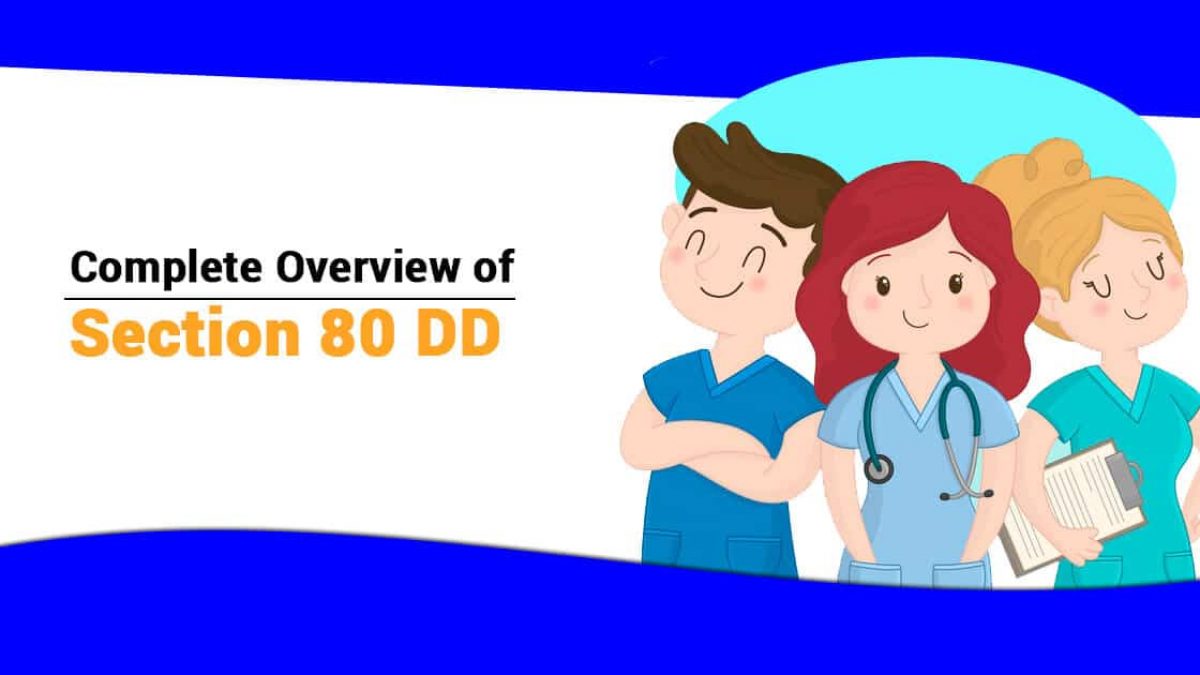Tax Benefits: Your Guide to the 80DD Deduction
The 80DD deduction, a lesser-known gem in the realm of tax benefits, holds immense potential for those providing care to dependents with disabilities. In this comprehensive guide, we embark on a journey to unlock the tax-saving possibilities offered by Section 80DD of the Income Tax Act. Recent updates and essential insights await those ready to navigate the world of deductions designed to provide support for disabled dependents.

Understanding the 80DD Deduction:
Before delving into the intricacies of the 80DD deduction, it’s essential to grasp its core concept. Under Section 80DD of the Income Tax Act, taxpayers can claim deductions for expenses incurred on the maintenance and care of dependents with disabilities. This deduction recognizes the additional financial burden placed on individuals or families caring for disabled dependents. By understanding the nuances of this deduction, you can optimize your tax-saving strategies.
Types of Disabilities Covered:
The scope of the 80DD deduction extends to a wide range of disabilities, acknowledging the diverse needs of those who require support. It encompasses disabilities such as:
Physical Disabilities:
This category includes mobility impairments, amputations, and other physical conditions that hinder an individual’s ability to perform daily activities.
Intellectual Disabilities:
Conditions that affect cognitive function, such as Down syndrome, autism, and intellectual developmental disorders, are covered.
Mental Illness:
Section 80DD recognizes the financial strain posed by mental health conditions like schizophrenia, bipolar disorder, and other severe mental illnesses.
Severe Disabilities:
For those with severe or profound disabilities, the deduction is applicable, ensuring adequate financial support.
Multiple Disabilities:
In cases where a person has multiple disabilities, the deduction accounts for the combined impact of these conditions.
Maximum Deduction Limit:
Claiming the 80DD deduction offers significant financial benefits, but it’s essential to understand the maximum deduction limits associated with this provision. These limits can vary depending on the disability’s severity, as assessed by a medical professional. The allowable deductions typically range from Rs. 75,000 to Rs. 1.25 lakh.
Understanding the nuances of these limits empowers you to make the most of the 80DD deduction based on your specific circumstances.
Claiming Procedure:
Obtaining the 80DD deduction involves a straightforward claiming procedure. To unlock this tax benefit:
Assess Eligibility:
Determine whether you meet the eligibility criteria based on the type and severity of the disability.
Gather Documentation:
Collect essential documents, including medical certificates and disability certificates issued by relevant authorities.
Complete Tax Filing:
While filing your income tax return, claim the deduction under Section 80DD and provide the necessary details.
Understanding the claiming procedure ensures that you benefit from the 80DD deduction while complying with the required documentation and processes.
Supporting Documents:
Proper documentation is the backbone of successfully claiming the 80DD deduction. To ensure a smooth process:
Medical Certificates:
Secure certificates from authorized medical practitioners certifying the disability and its severity.
Disability Certificates:
Obtain disability certificates issued by recognized medical boards.
Dependent’s Details:
Maintain detailed records of your disabled dependent’s information, such as name, relationship, and disability type.
Recent Changes and Updates:
Tax regulations are subject to change, and it’s crucial to stay informed about any recent updates regarding the 80DD deduction. As of [mention the most recent year for updates], there have been several noteworthy changes. These updates may include alterations to deduction limits, eligibility criteria, or additional allowances.
To ensure you’re capitalizing on the most current benefits, consult the latest tax guidelines or a tax professional who can provide insights into the latest changes and their impact on your tax planning.
Frequently Asked Questions
1. Who qualifies for the 80DD deduction?
– The 80DD deduction is available to individual taxpayers who incur expenses for the maintenance and care of a dependent with a disability.
2. What disabilities are covered under the 80DD deduction?
– The deduction covers a wide range of disabilities, including physical disabilities, intellectual disabilities, mental illnesses, severe disabilities, and multiple disabilities.
3. How is the deduction amount determined under 80DD?
– The deduction amount varies based on the severity of the disability. Higher deductions are allowed for severe and profound disabilities.
4. Can I claim both the 80DD and 80U deductions simultaneously?
– No, you can claim either the 80DD or 80U deduction, but not both. The choice depends on whether you’re claiming for a dependent or for yourself as an individual with a disability.
5. What documentation is required to claim the 80DD deduction?
– To claim the deduction, you need to submit medical certificates and disability certificates issued by authorized medical professionals.
6. Can I claim the 80DD deduction for multiple dependents with disabilities?
– Yes, you can claim the deduction for multiple dependents with disabilities, provided you meet the eligibility criteria for each dependent.
7. Are there any specific forms to be filled when claiming the 80DD deduction?
– Yes, you’ll need to fill and submit Form 10-IA to claim the deduction for maintenance and medical treatment of a dependent with a disability.
8. What should I do if the disability certificate has expired?
– It’s essential to renew the disability certificate in a timely manner to continue claiming the deduction. Ensure you have a valid certificate when filing your taxes.
9. Are there any age restrictions for claiming the 80DD deduction for a dependent?
– No, there are no age restrictions for claiming the deduction for a dependent with a disability. You can claim the deduction irrespective of the dependent’s age.
10. Is the 80DD deduction applicable for expenses incurred on medical treatment?
– Yes, the deduction covers both maintenance and medical treatment expenses of dependents with disabilities, making it a comprehensive tax-saving provision.
Conclusion:
In the intricate world of tax planning, the 80DD deduction emerges as a beacon of financial support for those caring for dependents with disabilities. As we conclude this journey through tax-saving strategies, it’s evident that the 80DD deduction provides substantial relief to individuals and families facing the financial challenges of supporting disabled dependents.
By understanding the eligibility criteria, the diverse types of disabilities covered, and the claiming procedures, you can harness the full potential of this deduction to ease your financial burden. Additionally, staying updated on the latest changes ensures that you’re making the most of the benefits available to you.




